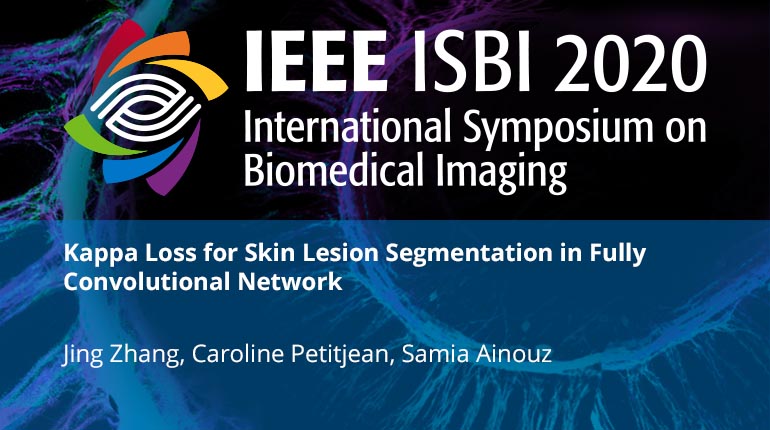
Already purchased this program?
Login to View
This video program is a part of the Premium package:
Kappa Loss for Skin Lesion Segmentation in Fully Convolutional Network
- IEEE MemberUS $11.00
- Society MemberUS $0.00
- IEEE Student MemberUS $11.00
- Non-IEEE MemberUS $15.00
Kappa Loss for Skin Lesion Segmentation in Fully Convolutional Network
Skin melanoma represents a major health issue. Today, diagnosis and follow-up maybe performed thanks to computer-aided diagnosis tool, to help dermatologists segment and quantitatively describe the image content. In particular, deep convolutional neural networks (CNN) have lately been become the state-of-the-art in medical image segmentation. The loss function plays an important role in CNN in the process of backpropagation. In this work, we propose a metric-inspired loss function, based on the Kappa index. Unlike the Dice loss, the Kappa loss takes into account all the pixels in the image, including the true negative, which we believe can improve the accuracy of the evaluation process between prediction and ground truth. We demonstrate the differentiability of the Kappa loss and present some results on six public datasets of skin lesion. Experiments have shown promising results in skin lesion segmentation.
Skin melanoma represents a major health issue. Today, diagnosis and follow-up maybe performed thanks to computer-aided diagnosis tool, to help dermatologists segment and quantitatively describe the image content. In particular, deep convolutional neural networks (CNN) have lately been become the state-of-the-art in medical image segmentation. The loss function plays an important role in CNN in the process of backpropagation. In this work, we propose a metric-inspired loss function, based on the Kappa index. Unlike the Dice loss, the Kappa loss takes into account all the pixels in the image, including the true negative, which we believe can improve the accuracy of the evaluation process between prediction and ground truth. We demonstrate the differentiability of the Kappa loss and present some results on six public datasets of skin lesion. Experiments have shown promising results in skin lesion segmentation.
 Cart
Cart Create Account
Create Account Sign In
Sign In





